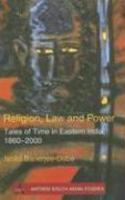
Book Summary
'This is a lucid and richly documented account of the mutual penetration of religion and politics; it should be read both by historians of religion and by historians of South Asia.' "Richard M. Eaton, Professor of History, University of Arizona " This book constructs an anthropological history of a subaltern religious formation, Mahima Dharma of Orissa, a large province in eastern India. Tracking the contingent making of a critical community over a hundred and forty year period, "Religion, Law and Power" explores the interplay of distinct expressions of time and history, innovative reformulations of caste and Hinduism and distinct engagements with state and nation. This serves to unravel the wider entanglements of religion, history, law, modernity and power. Ishita Banerjee-Dube provides a situated and critical analysis of the different trajectories of Mahima Dharma, bringing to the fore a clutch of empirical and theoretical issues. Understandings of the articulation and institutionalization of a subaltern religious order are not marked off from, but reveal the techniques and textures of, the modern state and dominant Hinduism. Such moves foreground subaltern and ascetic expressions and negotiations of modernity in institutional and everyday arenas, and further question widespread propositions of a singular Hinduism, especially in India today. "Religion, Law and Power" should be of interest to historians, anthropologists and religious studies scholars as well as general readers interested in religion, politics, community and state. It will be of particular interest to students of South Asia concerned with Hinduism and religious sects, history and law, and power andresistance. Ishita Banerjee-Dube is Associate Professor at the Centre for South Asian Studies, El Colegio de Mexico. Her previous publications include "Divine Affairs: Religion, Pilgrimag"e, "and the State in Colonial and Postcolonial India" (Shimla, 2001). Anthem South Asian Studies provides comprehensive coverage of all aspects of the region, past and present. Guided by a team of leading academics and thinkers from around the world, the series focuses on key issues in fields, ranging from economics and politics to history and the arts, and will appeal to academics, students and general readers alike. This book constructs an anthropological history of a subaltern religious formation, Mahima Dharma of Orissa, a large province in eastern India. Tracking the contingent making of a critical community over a hundred and forty year period, Religion, Law and Power explores the interplay of distinct expressions of time and history, innovative reformulations of caste and Hinduism and distinct engagements with state and nation. This serves to unravel the wider entanglements of religion, history, law, modernity and power. Ishita Banerjee-Dube provides a situated and critical analysis of the different trajectories of Mahima Dharma, bringing to the fore a clutch of empirical and theoretical issues. Understandings of the articulation and institutionalization of a subaltern religious order are not marked off from, but reveal the techniques and textures of, the modern state and dominant Hinduism. Such moves foreground subaltern and ascetic expressions and negotiations of modernity in institutional and everyday arenas, and further question widespread propositions of a singular Hinduism, especially in India today. 'Religion, Law and Power' should be of interest to historians, anthropologists and religious studies scholars as well as general readers interested in religion, politics, community and state. It will be of particular interest to students of South Asia concerned with Hinduism and religious sects, history and law, and power and resistance.
Book Details
| Book Name | Religion, Law And Power: Tales Of Time In Eastern India, 1860-2000 |
| Author | Ishita Banerjee-dube |
| Publisher | Anthem Press (Jan 2007) |
| ISBN | 9781843312345 |
| Pages | 225 |
| Language | English |
| Price | 3691 |








